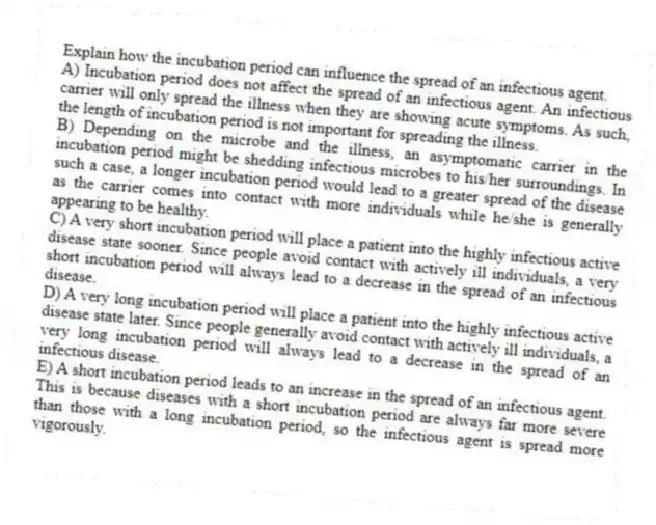
Explain how the incubation period can influence the spread of an infectious agent.
A) Incubation period does not affect the spread of an infectious agent. An infectious carrier will only spread the illness when they are showing acute symptoms. As such, the length of incubation period is not important for spreading the illness.
B) Depending on the microbe and the illness, an asymptomatic carrier in the incubation period might be shedding infectious microbes to his/her surroundings. In such a case, a longer incubation period would lead to a greater spread of the disease as the carrier comes into contact with more individuals while he/she is generally appearing to be healthy.
C) A very short incubation period will place a patient into the highly infectious active disease state sooner. Since people avoid contact with actively ill individuals, a very short incubation period will always lead to a decrease in the spread of an infectious disease.
D) A very long incubation period will place a patient into the highly infectious active disease state later. Since people generally avoid contact with actively ill individuals, a very long incubation period will always lead to a decrease in the spread of an infectious disease.
E) A short incubation period leads to an increase in the spread of an infectious agent. This is because diseases with a short incubation period are always far more severe than those with a long incubation period, so the infectious agent is spread more vigorously.
Correct Answer:
Verified
Q68: A fly that walks on feces and
Q69: In 1918-1919, an influenza virus infected about
Q70: Explain the most likely reason why smallpox
Q71: Please select the False statement.
A) A common
Q72: The situation described in this case study
Q74: Some populations more than others are likely
Q75: Which of the following pathogens/diseases would be
Q76: Which pathogen is INCORRECTLY matched with a
Q77: Which of the following best defines an
Q78: The portal of entry of the pathogen
Unlock this Answer For Free Now!
View this answer and more for free by performing one of the following actions

Scan the QR code to install the App and get 2 free unlocks

Unlock quizzes for free by uploading documents